Running 400 cows across two milking units and wintering cows in six yards is no simple task, but Denis Cody is taking it in his stride, and achieving top-class performance on top of that.
Denis, from Clonmore in Co Tipperary, was one of the host farmers for this year’s Irish Grassland Association summer tour, alongside Tom and Norma Walsh from Crosspatrick in Co Kilkenny.
When Denis returned home from agricultural college in 2010, they were farming a lot of land, but quota restrictions meant that they could only milk 100 cows.
With an ambition to grow the business, Denis sought and was successful for new entrant milk quota in 2013 and set up a dairy farm on a leased block with 18ha, 9km away in 2013.
Additional land has since been leased next to this block, with 48ha in this milking block and 150 cows being milked there now, which is a stocking rate of 3.12 cows/ha.
Another 150 cows have been milked on the home farm since quotas went in 2015, but an additional 44ha was leased last year bringing that milking platform to 90ha. There are now 250 cows being milked on the home farm with plans to go to 300 cows next year, which will be a stocking rate of 3.3 cows/ha.
“I find 3.3 cows/ha is the sweet spot for milking platform stocking rate. I’ve been stocked higher than this in the past but I find that it takes longer to come out of the pinch points when grass is scarce. The overall stocking rate will remain at 2.5 livestock units/ha,” Denis said at the walk.
Milk solids
Animal performance is excellent, with the herd delivering 524kg MS/cow to Centenary Co-op in 2021 from 750kg of meal. When asked if he would get more milk solids if he fed more meal, Denis said he didn’t think so, that any time he fed more meal due to a lack of grass the cows didn’t milk any more.
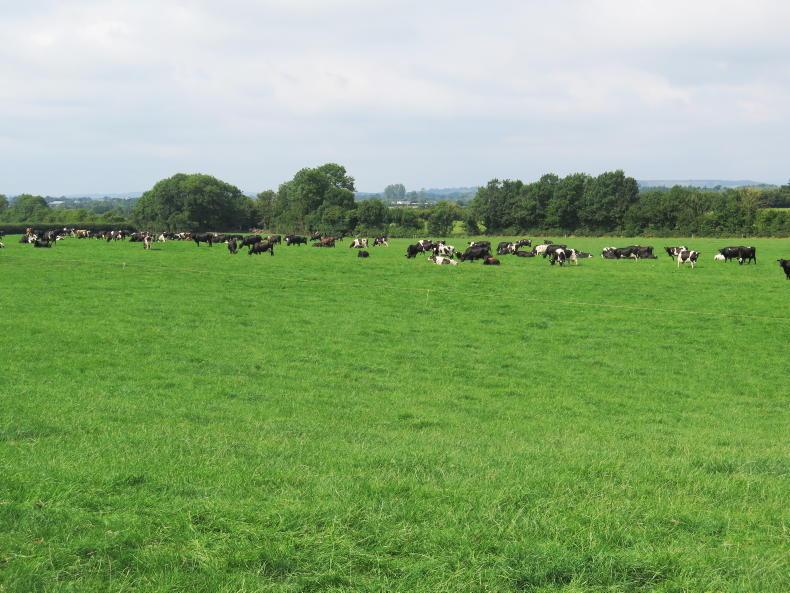
The Cody herd of 250 cows on the home farm.
He said that at least 250kg of the 750kg of meal fed is purely for ease of management, encouraging cows into the parlour during the summer.
The EBI of the cows is €174 and Denis has been crossbreeding for almost 20 years, putting a Jersey bull on a cow that looks like a Friesian and vice versa. Up until this year, only proven bulls were being used but he is now using some genomic bulls too.
While the cows are housed in six different yards over the winter, all cows are brought home for calving. The first 150 cows calved are then brought to the second unit in mid-February with this farm then fully stocked. Long-term employee Tommy looks after this farm, with Denis doing the grass walks.
Because the cows on this farm all calve early, Denis has decided to use fixed-time AI and 100% sexed semen on them. So all cows get a CIDR/PRID and are bred on the one day, along with all of the maiden heifers.
All cows on the home farm and all repeats are bred to beef AI or beef stock bulls. While it is Denis’s first year using sexed semen, it should more or less eliminate the Jersey crossbred bull calf issue from his farm.

Denis Cody speaking at the Irish Grassland Association walk on Tuesday.
The conception rate to fixed-time AI and sexed semen was 56% for both the cows and heifers.
There are two full-time employees on the farm who have been working for the Codys for 10 and 15 years each. Denis is on the farm full-time and his parents, Eamon and Anne look after all the bookwork.
We respect them, pay them well and have good facilities, a nice clean, tidy farm is important
“There’s no silver bullet to retaining staff. They’re excellent men and we’re lucky to have them. We respect them, pay them well and have good facilities, a nice clean, tidy farm is important,” Denis said.
The long-term plan is to construct additional cubicles on the home farm, to cut down on the amount of winter feeding in separate yards.
Denis said the winter months are actually OK. They can feed them twice a week but the real problems arise in March when the weather is bad and the cows may not be where the cubicles are.
Infrastructure on the farm is superb, with fantastic farm roadways topped with lime fines in December and let bed in over the winter/spring.
Almost all slurry is spread by umbilical pipe, so this helps to keep the surface on roads good.

Superb roadways on the Cody farm.
Contractors are used heavily, even for jobs such as dehorning calves and clipping cows’ tails four times per year.
The 18-unit parlour on the home farm is due to be upgraded next year to a 24- or 26-unit herringbone. The original eight-unit parlour on the outfarm has since been upgraded to a 14-unit.
Denis says his preference is for there to be 11 paddocks on the farm, although with expansion there are now 16 paddocks or so on both units.
He says that 11 paddocks are ideal, with cows getting four to five grazings per paddock, meaning there are fewer decisions to be made on a weekly basis about when cows need to be moved on.
During the back-end of the year when covers go higher, they will split the paddocks in half.
Thin cows are dried off early in October to ensure they are at the right body condition score for calving. Denis will also put freshly calved cows on once-a-day milking in spring if they are light.
Fertility performance is excellent with just 6% of the herd empty after 10 weeks of breeding last year. Denis bred for nine weeks this year and took the bulls away on 1 July.
After recovering from cancer in 2016/2017, Denis says any further expansion will have to fit in with his goals for work-life balance.
“I’m very happy with what we have achieved to date and would look at other opportunities but not at the expense of work-life balance.” He encouraged those in attendance to seek medical help early if they notice anything unusual.
“We all think we’re bulletproof but the sooner you find a problem the sooner it’s fixed,” he said.
Running 400 cows across two milking units and wintering cows in six yards is no simple task, but Denis Cody is taking it in his stride, and achieving top-class performance on top of that.
Denis, from Clonmore in Co Tipperary, was one of the host farmers for this year’s Irish Grassland Association summer tour, alongside Tom and Norma Walsh from Crosspatrick in Co Kilkenny.
When Denis returned home from agricultural college in 2010, they were farming a lot of land, but quota restrictions meant that they could only milk 100 cows.
With an ambition to grow the business, Denis sought and was successful for new entrant milk quota in 2013 and set up a dairy farm on a leased block with 18ha, 9km away in 2013.
Additional land has since been leased next to this block, with 48ha in this milking block and 150 cows being milked there now, which is a stocking rate of 3.12 cows/ha.
Another 150 cows have been milked on the home farm since quotas went in 2015, but an additional 44ha was leased last year bringing that milking platform to 90ha. There are now 250 cows being milked on the home farm with plans to go to 300 cows next year, which will be a stocking rate of 3.3 cows/ha.
“I find 3.3 cows/ha is the sweet spot for milking platform stocking rate. I’ve been stocked higher than this in the past but I find that it takes longer to come out of the pinch points when grass is scarce. The overall stocking rate will remain at 2.5 livestock units/ha,” Denis said at the walk.
Milk solids
Animal performance is excellent, with the herd delivering 524kg MS/cow to Centenary Co-op in 2021 from 750kg of meal. When asked if he would get more milk solids if he fed more meal, Denis said he didn’t think so, that any time he fed more meal due to a lack of grass the cows didn’t milk any more.

The Cody herd of 250 cows on the home farm.
He said that at least 250kg of the 750kg of meal fed is purely for ease of management, encouraging cows into the parlour during the summer.
The EBI of the cows is €174 and Denis has been crossbreeding for almost 20 years, putting a Jersey bull on a cow that looks like a Friesian and vice versa. Up until this year, only proven bulls were being used but he is now using some genomic bulls too.
While the cows are housed in six different yards over the winter, all cows are brought home for calving. The first 150 cows calved are then brought to the second unit in mid-February with this farm then fully stocked. Long-term employee Tommy looks after this farm, with Denis doing the grass walks.
Because the cows on this farm all calve early, Denis has decided to use fixed-time AI and 100% sexed semen on them. So all cows get a CIDR/PRID and are bred on the one day, along with all of the maiden heifers.
All cows on the home farm and all repeats are bred to beef AI or beef stock bulls. While it is Denis’s first year using sexed semen, it should more or less eliminate the Jersey crossbred bull calf issue from his farm.

Denis Cody speaking at the Irish Grassland Association walk on Tuesday.
The conception rate to fixed-time AI and sexed semen was 56% for both the cows and heifers.
There are two full-time employees on the farm who have been working for the Codys for 10 and 15 years each. Denis is on the farm full-time and his parents, Eamon and Anne look after all the bookwork.
We respect them, pay them well and have good facilities, a nice clean, tidy farm is important
“There’s no silver bullet to retaining staff. They’re excellent men and we’re lucky to have them. We respect them, pay them well and have good facilities, a nice clean, tidy farm is important,” Denis said.
The long-term plan is to construct additional cubicles on the home farm, to cut down on the amount of winter feeding in separate yards.
Denis said the winter months are actually OK. They can feed them twice a week but the real problems arise in March when the weather is bad and the cows may not be where the cubicles are.
Infrastructure on the farm is superb, with fantastic farm roadways topped with lime fines in December and let bed in over the winter/spring.
Almost all slurry is spread by umbilical pipe, so this helps to keep the surface on roads good.

Superb roadways on the Cody farm.
Contractors are used heavily, even for jobs such as dehorning calves and clipping cows’ tails four times per year.
The 18-unit parlour on the home farm is due to be upgraded next year to a 24- or 26-unit herringbone. The original eight-unit parlour on the outfarm has since been upgraded to a 14-unit.
Denis says his preference is for there to be 11 paddocks on the farm, although with expansion there are now 16 paddocks or so on both units.
He says that 11 paddocks are ideal, with cows getting four to five grazings per paddock, meaning there are fewer decisions to be made on a weekly basis about when cows need to be moved on.
During the back-end of the year when covers go higher, they will split the paddocks in half.
Thin cows are dried off early in October to ensure they are at the right body condition score for calving. Denis will also put freshly calved cows on once-a-day milking in spring if they are light.
Fertility performance is excellent with just 6% of the herd empty after 10 weeks of breeding last year. Denis bred for nine weeks this year and took the bulls away on 1 July.
After recovering from cancer in 2016/2017, Denis says any further expansion will have to fit in with his goals for work-life balance.
“I’m very happy with what we have achieved to date and would look at other opportunities but not at the expense of work-life balance.” He encouraged those in attendance to seek medical help early if they notice anything unusual.
“We all think we’re bulletproof but the sooner you find a problem the sooner it’s fixed,” he said.








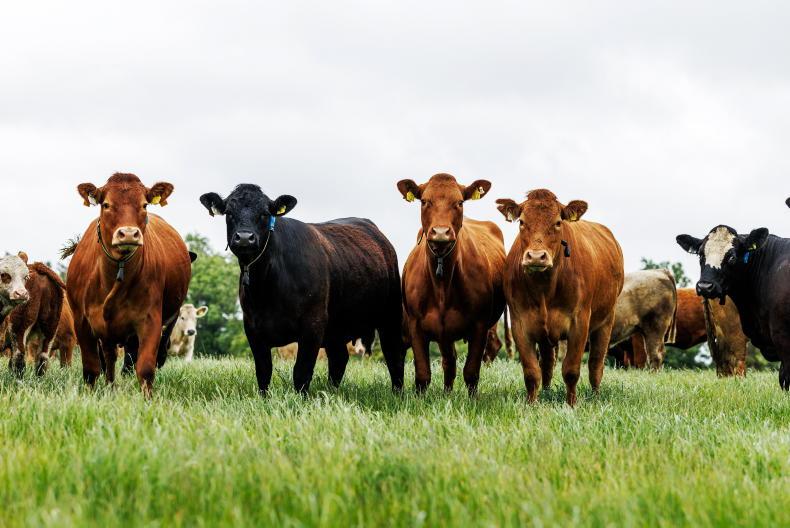

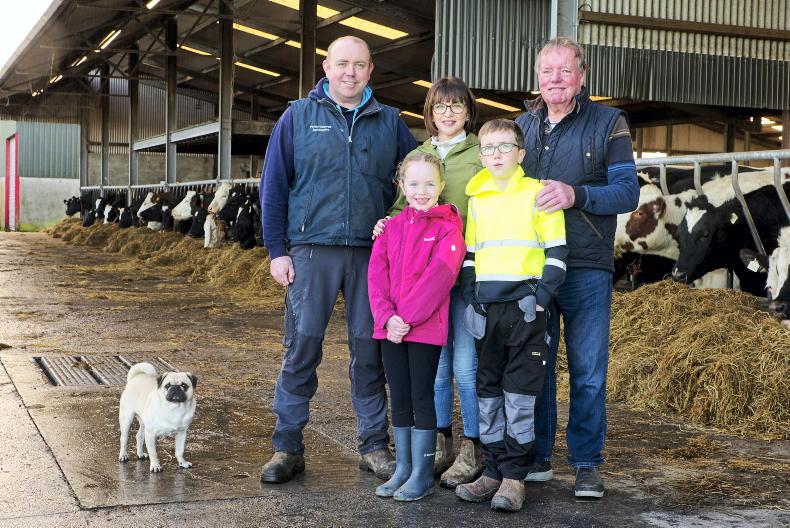
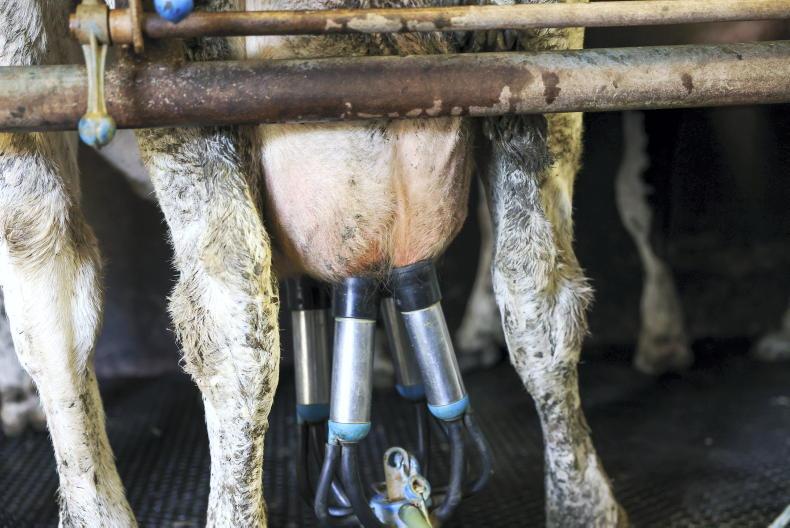
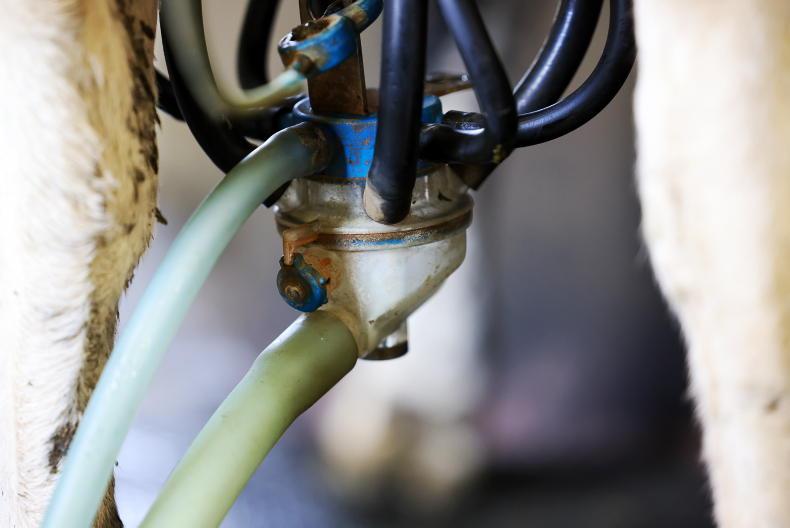
SHARING OPTIONS